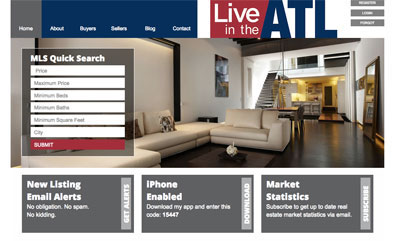You are viewing our site as an Agent, Switch Your View:
Agent | Broker Reset Filters to Default Back to List3 Ways to Make Your Website More Than Simply an "Online Brochure"
December 10 2014
 In my day to day course of business, I probably look at at least 20 to 30 real estate agents' websites per day. Sometimes it's because people ask me to review their current site, so we run them though things like the Marketing Grader. Sometimes I'm checking out new technologies I hear about on agent or brokerage sites. And sometimes I'm even just surfing the web, for the heck of it.
In my day to day course of business, I probably look at at least 20 to 30 real estate agents' websites per day. Sometimes it's because people ask me to review their current site, so we run them though things like the Marketing Grader. Sometimes I'm checking out new technologies I hear about on agent or brokerage sites. And sometimes I'm even just surfing the web, for the heck of it.
What I've come to find out, though, is that while there are many features that can be on websites and many amazing technological advancements that have been made, when you boil it down, there are still two main types of real estate websites. There are sites that are informative, interactive spots for home buyers and sellers to go to and educate themselves, and there are sites that are simply "online brochures."
So you want more than simply an online brochure, right? What are the differences? Today, I want to share with you three tips you can use on your real estate website to make sure that you have more than just an online brochure.
1) Remember, if you want to be seen as THE Expert, you need to establish yourself as an expert
While it might be tempting to have statements and information all over your website about how you are the top percentage of this or that, or how you have sold $x amount of real estate in your career, etc., don't do this. The truth is nobody cares about any of this. As humans, we are all a little bit selfish and only care about ourselves.
Additionally, if a buyer or seller has found your website through a search engine, it is because they are online, researching and educating themselves for what they are about to embark on. The quickest way to establish yourself as the thought leader and expert in your marketplace is to give the people what they want.
Write blog posts that address common questions people have about buying and selling real estate. Have pages inviting people to events related to learning facets of buying and selling (e.g. team with a mortgage professional for a loan workshop). Make sure you give people an easy way to subscribe to these articles so they automatically go right into their email inbox.
2) Use CTAs and Landing Pages Throughout Your Site
While landing pages help you with SEO and help build your inbound marketing strategy, strong calls-to-action and landing pages for your website are also a valuable way for buyers and sellers to not only get additional educational information about your services, but also raise their hands as people that are potentially interested in hiring you.
Being able to quantify this and being able to double back and nurture these leads is critical to the success of an interactive website. A simple website with nothing more than a mere "contact me" form IS NOT this. Be sure you have an easy way to set up these CTAs and landing pages.
3) Encourage Conversation and Debate
One thing I see all the time on real estate agents' websites is that they've set up their websites so that they are simply "talking at" their prospective clients and not engaging them in the conversation. A critical element to the interactive experience is actually inviting your website visitors into the conversation.
Blogs are a great place to start. Allow people to comment on your posts. Don't be afraid for them to disagree with you, either. When they do reply, be sure to promptly follow up with them, let them know you appreciate their comments, and then engage them in conversation.
Don't fall victim to having nothing more than an "online brochure" on the internet. The most successful agents know that the only way to become successful is to engage your marketplace and establish yourself as the thought leader. These tips will help you get on your way.
To view the original article, visit the Leading Agent blog.









